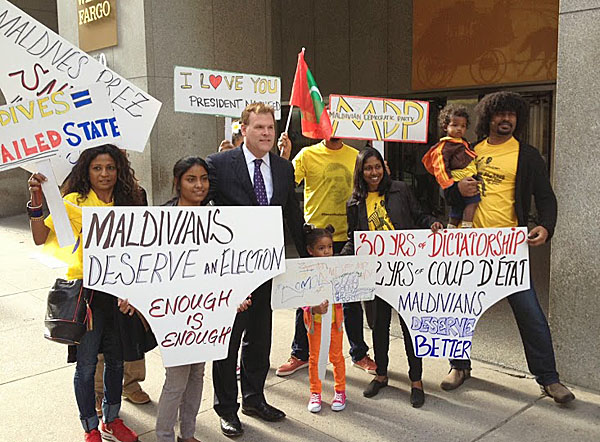The Maldivian government has called on the UN to ensure “non-interference in internal affairs of sovereign states.”
In her address to the UN General Assembly on October 1, Acting Foreign Minister Dr Mariyam Shakeela referred to “concerted efforts by external forces to prevent the emergence of an indigenous democratic system of governance in the Maldives [by] attempting to shape the outcome of, what is, an internal issue”.
Dr Shakeela’s comments follow global concern over the Supreme Court’s indefinite suspension of a constitutionally-mandated run-off election scheduled for September 28. Police enforced the order on Saturday by surrounding the Elections Commission with orders to storm the building and seize the ballot papers unless the commission capitulated.
“Democracy consolidation is not just about holding elections. Nor is it about having a democratically sound Constitution. In the Maldives too, we quickly found that changing the Constitution, or having a multi-party election, did not instill democratic values within our society,” Dr Shakeela told the UN.
“For democracy to be cultivated and consolidated, the supremacy of the constitution must be upheld above all. The institutional deficiencies we face, must be addressed within constitutional provisions. And the political leadership must sustain an unshakable commitment to the principles and values of states.”
Presidential candidate Gasim Ibrahim, who placed third in the first round with 24.07 percent of the vote, went to the Supreme Court seeking to annul the vote alleging widespread electoral fraud and declaring “God Willing, Gasim will be President on November 11”.
He was swiftly joined in court by second-placed Abdulla Yameen, who received 25.35 percent of the vote, and Attorney General Azima Shukoor, Yameen’s former lawyer. Siding against the Elections Commission, the three alleged electoral irregularities despite the unanimous positive assessments of local and international election observers, including the UN itself.
In a statement, UN Secretary General Bai Ki-moon said he was concerned about the Supreme Court’s postponement of the second round, given that the first round was “widely recognised as a success by international and domestic election observers.”
“It is of the utmost importance that the will of the people be respected in deciding the future of the country. These are pivotal elections for reaffirming the democratic process in the Maldives,” stated the UN Secretary General.
Dr Shakeela meanwhile told the UN that “Some of the parties that competed in the election have identified serious issues with the conduct of the elections, and have asked the Supreme Court of the Maldives for a ruling. We are expecting the Court to come out with a ruling in the coming days. The integrity of the second round of our Presidential election cannot be maintained without ensuring the integrity of the first round through Constitutional means. We await the Supreme Court’s verdict to continue the electoral process.”
Dr Shakeela went on to accuse “some external forces” of “attempting to shape the outcome of, what in effect is, an internal issue. The Maldives is small. Our democracy is at an infant stage. Our institutions are young. That does not, however, mean that larger countries have a right to intervene and attempt to dictate outcomes in domestic affairs of the Maldives.”
Protests resulting from the suspension of the election have meanwhile led to other countries including the UK, China, Canada and Australia to upgrade their travel advisories.
Likes (1)Dislikes
(1)Dislikes (0)
(0) 